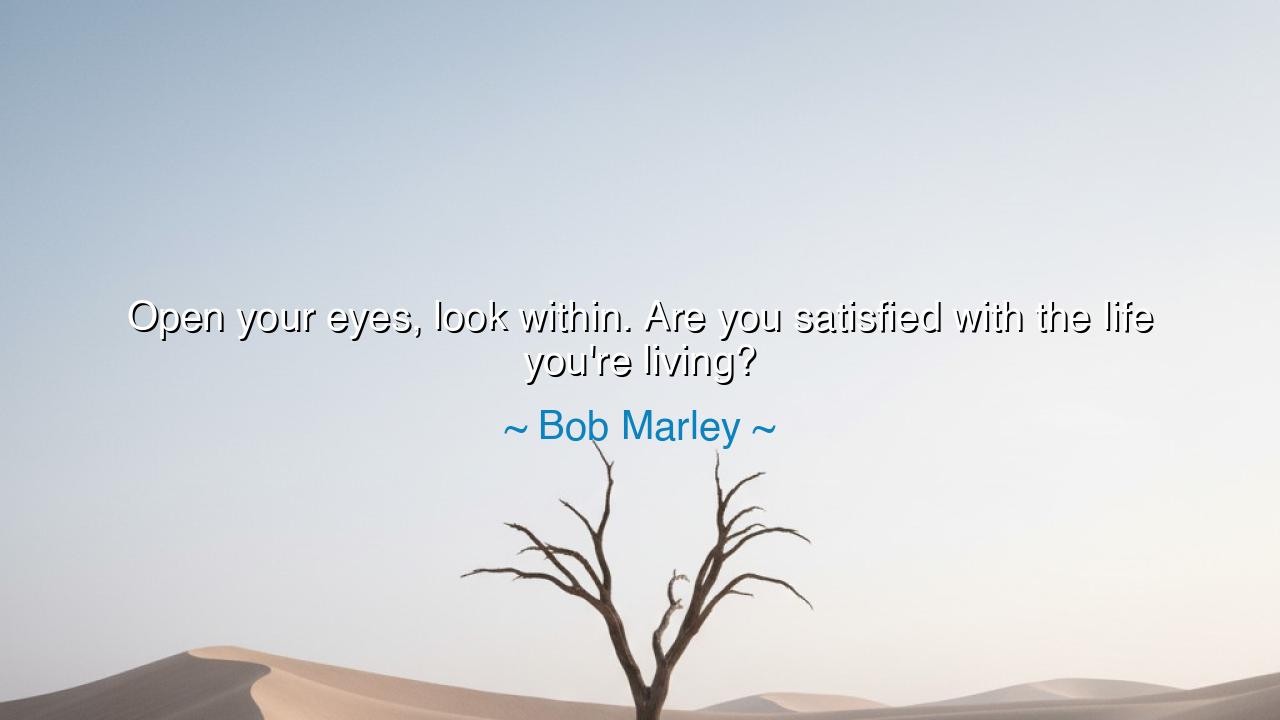
Open your eyes, look within. Are you satisfied with the life






When Bob Marley asked, “Open your eyes, look within. Are you satisfied with the life you’re living?” he spoke as a prophet of the soul, not merely as a musician. His words ring with the timeless call of the wise — the invitation to awareness, to self-examination, to awaken from the dream of habit and see one’s own life as it truly is. Beneath the rhythm of his music and the warmth of his smile lay the spirit of a teacher who urged humanity to rise above illusion and live with purpose. This quote, born from Marley’s deep Rastafarian faith and his belief in spiritual freedom, is not a question to be answered lightly, but a mirror held up to every heart.
The origin of this saying lies in Marley’s lifelong philosophy of consciousness — the belief that liberation begins not with revolution, but with reflection. He lived in a time of social struggle and colonial aftermath, when many sought freedom only in political change. But Marley, like the ancient sages, knew that no chains can truly be broken until the mind itself awakens. “Open your eyes,” he says — for many live with eyes wide open yet do not see. They rush through life’s days, enslaved by material desire, blinded by fear, and numbed by comfort. The first act of wisdom, Marley reminds us, is to see clearly — to pierce through illusion and recognize the truth of who we are and what we have become.
Then comes the second command: “Look within.” To look within is to enter the sacred temple of one’s own soul — a place both terrifying and beautiful. Many flee from it, for within dwell both our light and our shadow, our dreams and our regrets. But the one who dares to look within gains vision. The ancients called this self-inquiry the beginning of enlightenment. Socrates taught, “The unexamined life is not worth living.” Marley echoes this same truth across centuries and cultures — that man’s greatest blindness is not physical but spiritual, and that no change in the world can last unless it begins within the heart.
There is a story from Marley’s own life that gives flesh to these words. During the height of Jamaica’s political turmoil, when violence raged between rival factions, he survived an assassination attempt. Instead of retreating or retaliating, he returned to the stage days later to perform at the “Smile Jamaica” concert, his arm still wounded. When asked why, he said, “The people who are trying to make this world worse aren’t taking a day off. How can I?” In that act of courage, he had looked within and found clarity — that his life’s purpose was greater than his fear. He was not satisfied with a life of silence or safety; he chose one of truth and service, no matter the cost.
To be satisfied with the life one is living does not mean to be rich, powerful, or comfortable. It means to be in harmony with one’s conscience — to know that your life reflects your highest values. True satisfaction comes not from possession, but from alignment. The man who follows his calling, the woman who acts with love, the soul who lives honestly with themselves — these are the ones who sleep in peace. Marley’s question pierces like an arrow because it confronts us with our own dissonance: are we living, or merely existing? Are we guided by faith, or dragged by fear?
The meaning of this quote, therefore, is both personal and universal. It is a call to awakening, to examine whether your days serve your soul. Too often, life becomes a repetition — the same motions, the same words, the same empty pursuits. But to “open your eyes” is to remember that life is not a prison, but a journey of creation. Each day is clay, and we are the sculptors. Marley’s words remind us that the greatest rebellion is to live consciously — to choose meaning over numbness, and to be the author of one’s own destiny.






AAdministratorAdministrator
Welcome, honored guests. Please leave a comment, we will respond soon